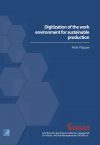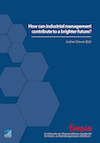Search


Bibtex
Cite as text
@Inbook{Schlund+Kostolani,
Cite-key = "Schlund2022",
Year= "2022",
Volume= "Schriftenreihe der Wissenschaftlichen Gesellschaft für Arbeits- und Betriebsorganisation (WGAB) e. V.",
Pages= "81-96",
Journal = "WGAB",
Title= "Towards Designing Adaptive and Personalized Work Systems in Manufacturing",
Author= "Sebastian Schlund, David Kostolani
Institut für Managementwissenschaften, Technische Universität Wien
",
Doi= "https://doi.org/10.30844/WGAB_2022_5",
Abstract= "Adaptation of work to humans instead of humans constantly adapting to work systems and work environments has been a goal of ergonomics since the 19th century. To date, an actual adaptation of work to the specific features, conditions and requirements of individual users has so far only taken place in rudimentary form. The possibilities have now opened up by the advances of Cyber Physical Production Systems (CPPS). This enables a renewed attempt to implement the goal of adapting work systems to workers. Integration of advanced sensory skills into work systems within manufacturing allows better recognition of the work environment and the actual state of the system. Together with actuator capabilities, it enables adaptive work systems to adjust their structure and behaviour to the anthropometric and the cognitive features and requirements of the systems’ users. However, a framework that integrates the concepts of adaptivity and personalization into the work system model and work system design is still missing.
This paper explores the roots of adaptive and personalized human-machine systems and shows a framework for integrating these concepts into work systems and manufacturing. Based on this, exemplary works and implementations of individual systems are presented and placed in the overall context. The focus is set on implementations within the TU Wien Pilot Factory that cover adaptability concepts on workplace, process, and system level.
",
Keywords= "adaptivity, adaptation, personalized work systems, human-computer interaction, human-machine systems
",
}
Sebastian Schlund, David Kostolani
Institut für Managementwissenschaften, Technische Universität Wien(2022): Towards Designing Adaptive and Personalized Work Systems in Manufacturing. Schriftenreihe der Wissenschaftlichen Gesellschaft für Arbeits- und Betriebsorganisation (WGAB) e. V.(2022), S. 81-96. Online: https://doi.org/10.30844/WGAB_2022_5 (Abgerufen 23.02.26)
Open Access
Abstract
Abstract
Adaptation of work to humans instead of humans constantly adapting to work systems and work environments has been a goal of ergonomics since the 19th century. To date, an actual adaptation of work to the specific features, conditions and requirements of individual users has so far only taken place in rudimentary form. The possibilities have now opened up by the advances of Cyber Physical Production Systems (CPPS). This enables a renewed attempt to implement the goal of adapting work systems to workers. Integration of advanced sensory skills into work systems within manufacturing allows better recognition of the work environment and the actual state of the system. Together with actuator capabilities, it enables adaptive work systems to adjust their structure and behaviour to the anthropometric and the cognitive features and requirements of the systems’ users. However, a framework that integrates the concepts of adaptivity and personalization into the work system model and work system design is still missing. This paper explores the roots of adaptive and personalized human-machine systems and shows a framework for integrating these concepts into work systems and manufacturing. Based on this, exemplary works and implementations of individual systems are presented and placed in the overall context. The focus is set on implementations within the TU Wien Pilot Factory that cover adaptability concepts on workplace, process, and system level.
Keywords
Schlüsselwörter
adaptivity, adaptation, personalized work systems, human-computer interaction, human-machine systems

 English
English
